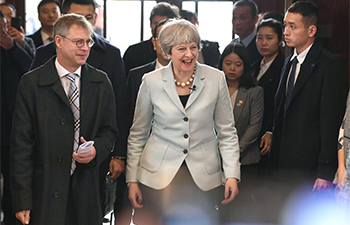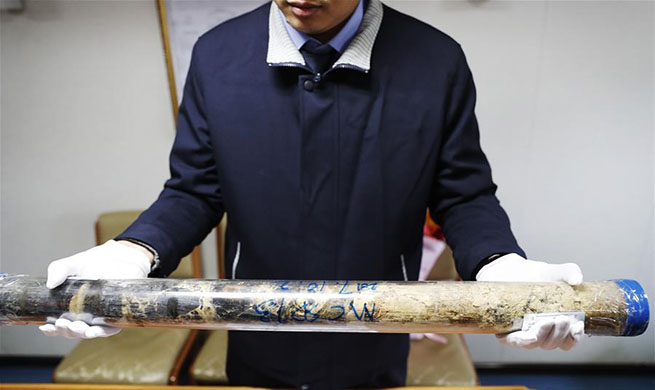by Magdalena Walczak-Jarosz
DAVOS, Switzerland, Jan. 30 (Xinhua) -- Industrial manufacturer Siemens AG aims to deepen cooperation with China in the Belt and Road Initiative and technological innovation, a Siemens senior executive has said.
"I am a huge supporter of the Belt and Road Initiative. I think it is the most relevant infrastructure project of our times," Cedrik Neike, member of the managing board of Siemens AG, told Xinhua in a recent exclusive interview at the Swiss ski resort of Davos.
Neike was among the world leaders and business magnates who gathered last week at Davos to discuss "creating a shared future in a fractured world," the theme of this year's World Economic Forum.
"The great thing about Belt and Road (Initiative) is that it is an inclusive project that is open for participation," Neike said. "We are already participating and we expect more opportunities for in-depth cooperation."
Neike, responsible for the Asian and Australian markets of the leading industrial manufacturing conglomerate, also referred to Chinese President Xi Jinping's landmark speeches delivered at Davos and at the United Nations (UN) Office at Geneva a year ago.
The theme of the forum this year resonated with Xi's vision of building a community with a shared future for mankind and achieving shared and win-win development.
"Opening the gate to the world and being an integral part of the world, we are fully supporting that. This is great," Neike said.
The senior executive also said that China has become a leader in global technological innovation.
"We have seen what China has done in terms of world technology. It is now a leader," Neike said.
"You have Alipay, you have WeChat," Neike said in reference to China's leading mobile payment and social media platforms, whose businesses have been booming rapidly at home and abroad in recent years.
"All these evolutions which are happening in the fin-tech (finance technology) industry means that not only collaborating with a lot of companies, universities, research institutes, but also leaving this change of society in China brings us a lot of digital experience," he said.
Neike also stressed that technology is not successful if the business model doesn't change. Citing Alipay and WeChat Pay as examples, he said both revolutions were enabled by the technology itself, but required a change in the business mindset.
Neike pointed out that the advances in technology, at the level of education and capabilities, as well as innovation are taking humans to the era of industry 4.0.
The three areas have also witnessed the most impressive cooperation between China and the German industrial manufacturing conglomerate in the past 40 years, he added.
"China will have similar issues as Germany. China is not a cheap manufacture place anymore. It needs to transform to advanced manufacturing, and needs technology ... to make manufacture more flexible," he said.
China has become one of Siemens' largest research and development locations worldwide. The company now enjoys cooperation with a number of local governments and 87 universities and technology institutes in China, with an aim to conduct scientific research and develop talent.
Siemens announced in 2017 that China would lead the company's global research in autonomous robotics. In line with this strategic move, Siemens has also formed a partnership with Tsinghua University to jointly set up a robotics research center in Beijing.
Neike explained where the idea of setting up the center in China came from: "A lot of our fundamental research actually happened in China by our Chinese team. The idea was to see where we have these teams with deep knowledge as well as where our robots will be in the future. We said let's build the whole business and the whole headquarters around it."
China has such an advanced and fast developing market that is leapfrogging a lot of technology steps. Neike said that both the electronic car revolution and next generation robots would happen in China.
Comparing China to the U.S. and European markets, Neike said the country had a scale of capability to accelerate its innovation drive and Siemens wants to be a part of it.


















